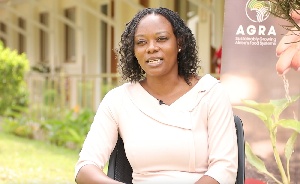Business News of Monday, 2 June 2025
Source: www.ghanawebbers.com
Empowered to Lead: How CALA helped me redefine Leadership in African Agriculture
CALA is an initiative led by AGRA. It supports countries and leaders in agriculture across Africa. The goal is to achieve the African Union’s Malabo Declaration and CAADP objectives. CALA believes that food system leaders need better tools for productivity. This will help farmers and boost prosperity in Africa.
AGRA invests in training future food systems leaders. A review of CAADP performance highlighted “limited specialized skills” as a challenge. The Kampala Declaration 2025 recognizes this issue. It introduces a sixth strategic objective to improve agri-food systems governance.
CALA offers practical leadership programs for agricultural transformation initiatives. These programs enhance collaboration and leadership capacity among leaders. They also prepare future public and private sector leaders for succession challenges in agriculture. CALA’s Action Learning Project provides hands-on experiences for senior and rising leaders.
One participant shared their experience with CALA coaching sessions. They explored both performance and emotional well-being with their coach. They learned that balance and self-awareness are essential for effective leadership. A breakthrough moment occurred when they shifted their leadership style.
They began using data-driven metrics to clarify team direction. Communication about the company’s mission improved, becoming clearer and more confident. Despite facing challenges, the cohort of five remained resilient through collaboration and support.
The participant now holds other influential leadership roles beyond teams. They engage in discussions on youth inclusion in agri-food systems. They advocate for policies that empower young Africans in agriculture.
They have participated in dialogues at Ghana's National Development Commission to shape Food System Agenda 2030 strategies. Alongside peers, they prioritize women and youth in transforming Ghana’s food systems.
Their work focuses on measurable outcomes through strategic planning and performance tracking. Participation in CALA ALP built their capacity to streamline agricultural projects effectively.
At home, their siblings now view agriculture as a viable career path instead of a fallback option. The participant serves as a role model, inspiring them toward careers in agriculture.
They were accepted as a 2025 Women Innovators & Leaders Development Fellow too. They attended the WILD Leadership Forum and traveled to Thailand for a UN conference preparation event, thanks to CALA involvement.
CALA creates a ripple effect; it empowers individuals while fostering broader transformation. The participant now mentors young professionals, sharing tools and beliefs about leadership being inclusive.
Career progression has been significant; they work as Partnerships Manager at WamiAgro, founded by a CALA alumnus. This showcases alumni collaboration's impact on Africa's agri-food sector.
They actively participate in the CALA Alumni Food Systems Community of Practice, supporting each other’s growth.
For those considering applying to CALA: do it! Even if it seems tough, apply again if needed. Transformation is real; Africa needs emotionally grounded, strategically sharp leaders who collaborate deeply.
CALA taught them not just about leadership but how to live it fully too. It empowered them to reshape Africa’s agricultural future one step at a time.
Organizations aiming to transform Africa's agricultural sector should consider investing in CALA ALP's model too! Its scalable design can drive significant change through strategic partnerships and collaboration.











